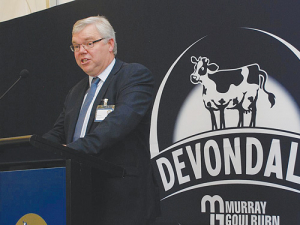Embattled Australian dairy co-op Murray Goulburn says it is willing to work with other processors on a commodity milk price index.
The co-op is facing pressure from politicians and farmer shareholders for a more transparent milk pricing scheme after it was forced to claw back money paid in advance to suppliers.
The Federal Government says a commodity milk price index is the way forward.
Speaking at MG’s annual meeting last month, outgoing chairman Philip Tracy said the co-op will join other members of the dairy industry to explore ideas for improving Australia’s pricing transparency.
“This includes introducing the proposed commodity milk price index, which should be independently managed and tailored for the benefit of all participants.”
Milk price transparency has attracted intense interest from suppliers, government and other stakeholders this year.
Tracy says the MG board wants a review of the current annualised milk pool process to see if it is fit for purpose.
“This is particularly important given the co-op’s reliance on global markets, where we are seeing increased volatility.”
This volatility has resulted in two price step-downs in the past eight years against a total of three step-downs in the co-op’s 66 year history.
Tracy says as a co-op, MG’s objective is to maximise the farmgate milk price paid to suppliers; it typically announces a forecast full year final milk price and then pays 90-92% of the final price as the opening milk price. This supports supplier cashflows and responds to the intense competition for milk in the Australian market, which motivates processors to pay the highest possible opening price.
But this mechanism has proved problematic twice in the past eight years, he says.
“In New Zealand the opening price is traditionally a lower percentage, between 60-70%, of the forecast final farmgate milk price. This reduces the risk of a price reduction during the season. It also means NZ dairy farmers do not have the same level of cashflow at the start of the season.”
He says in Europe, the mechanism is different again: dairy farmers are quoted milk prices monthly. This more accurately reflects monthly market conditions but hinders farmers’ ability to forecast the financial year.
Each of these approaches has advantages and disadvantages, Tracy says. “So MG must take the opportunity to review the best approach, to ensure the business sends the right market signals, while also balancing farmers’ need for cash against what the market is paying.”
This review will require input from suppliers, Tracy says.
Quitting, sorry
The chairman of Australia’s largest milk processor is stepping down.
Murray Goulburn chairman Philip Tracy says he will remain chairman “for as long as is required to effect an orderly transition to a new chairperson”.
Speaking at MG’s annual meeting last month, Tracy again apologised for the financial crisis facing farmer shareholders.
“I want to again express how deeply sorry I am that MG suppliers have had to endure such a heavy burden.
“As your chairman, I am responsible for the stewardship of MG and therefore ultimately accountable for its performance. While as a board we did what we could with the information we had at the time, we know the outcomes of that period have been devastating for suppliers and for that we are deeply sorry.”


















